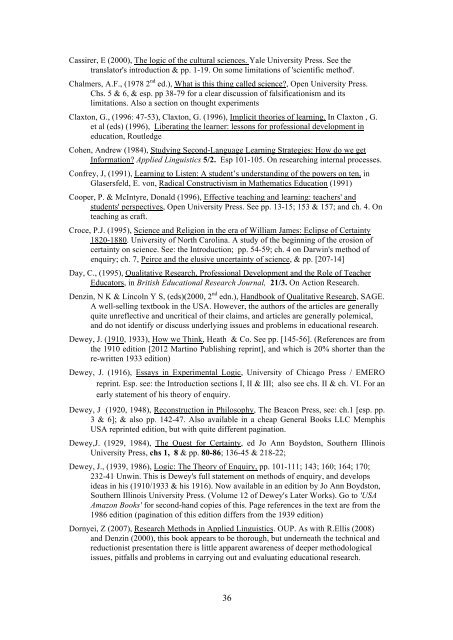RADICAL TEFL
2hqhXJd
2hqhXJd
Create successful ePaper yourself
Turn your PDF publications into a flip-book with our unique Google optimized e-Paper software.
Cassirer, E (2000), The logic of the cultural sciences. Yale University Press. See the<br />
translator's introduction & pp. 1-19. On some limitations of 'scientific method'.<br />
Chalmers, A.F., (1978 2 nd ed.), What is this thing called science?, Open University Press.<br />
Chs. 5 & 6, & esp. pp 38-79 for a clear discussion of falsificationism and its<br />
limitations. Also a section on thought experiments<br />
Claxton, G., (1996: 47-53), Claxton, G. (1996), Implicit theories of learning. In Claxton , G.<br />
et al (eds) (1996), Liberating the learner: lessons for professional development in<br />
education, Routledge<br />
Cohen, Andrew (1984), Studying Second-Language Learning Strategies: How do we get<br />
Information? Applied Linguistics 5/2. Esp 101-105. On researching internal processes.<br />
Confrey, J, (1991), Learning to Listen: A student’s understanding of the powers on ten, in<br />
Glasersfeld, E. von, Radical Constructivism in Mathematics Education (1991)<br />
Cooper, P. & McIntyre, Donald (1996), Effective teaching and learning: teachers' and<br />
students' perspectives, Open University Press. See pp. 13-15; 153 & 157; and ch. 4. On<br />
teaching as craft.<br />
Croce, P.J. (1995), Science and Religion in the era of William James: Eclipse of Certainty<br />
1820-1880. University of North Carolina. A study of the beginning of the erosion of<br />
certainty on science. See: the Introduction; pp. 54-59; ch. 4 on Darwin's method of<br />
enquiry; ch. 7, Peirce and the elusive uncertainty of science, & pp. [207-14]<br />
Day, C., (1995), Qualitative Research, Professional Development and the Role of Teacher<br />
Educators, in British Educational Research Journal, 21/3. On Action Research.<br />
Denzin, N K & Lincoln Y S, (eds)(2000, 2 nd edn.), Handbook of Qualitative Research, SAGE.<br />
A well-selling textbook in the USA. However, the authors of the articles are generally<br />
quite unreflective and uncritical of their claims, and articles are generally polemical,<br />
and do not identify or discuss underlying issues and problems in educational research.<br />
Dewey, J. (1910, 1933), How we Think, Heath & Co. See pp. [145-56]. (References are from<br />
the 1910 edition [2012 Martino Publishing reprint], and which is 20% shorter than the<br />
re-written 1933 edition)<br />
Dewey, J. (1916), Essays in Experimental Logic, University of Chicago Press / EMERO<br />
reprint. Esp. see: the Introduction sections I, II & III; also see chs. II & ch. VI. For an<br />
early statement of his theory of enquiry.<br />
Dewey, J (1920, 1948), Reconstruction in Philosophy, The Beacon Press, see: ch.1 [esp. pp.<br />
3 & 6]; & also pp. 142-47. Also available in a cheap General Books LLC Memphis<br />
USA reprinted edition, but with quite different pagination.<br />
Dewey,J. (1929, 1984), The Quest for Certainty, ed Jo Ann Boydston, Southern Illinois<br />
University Press, chs 1, 8 & pp. 80-86; 136-45 & 218-22;<br />
Dewey, J., (1939, 1986), Logic: The Theory of Enquiry, pp. 101-111; 143; 160; 164; 170;<br />
232-41 Unwin. This is Dewey's full statement on methods of enquiry, and develops<br />
ideas in his (1910/1933 & his 1916). Now available in an edition by Jo Ann Boydston,<br />
Southern Illinois University Press. (Volume 12 of Dewey's Later Works). Go to 'USA<br />
Amazon Books' for second-hand copies of this. Page references in the text are from the<br />
1986 edition (pagination of this edition differs from the 1939 edition)<br />
Dornyei, Z (2007), Research Methods in Applied Linguistics. OUP. As with R.Ellis (2008)<br />
and Denzin (2000), this book appears to be thorough, but underneath the technical and<br />
reductionist presentation there is little apparent awareness of deeper methodological<br />
issues, pitfalls and problems in carrying out and evaluating educational research.<br />
36


